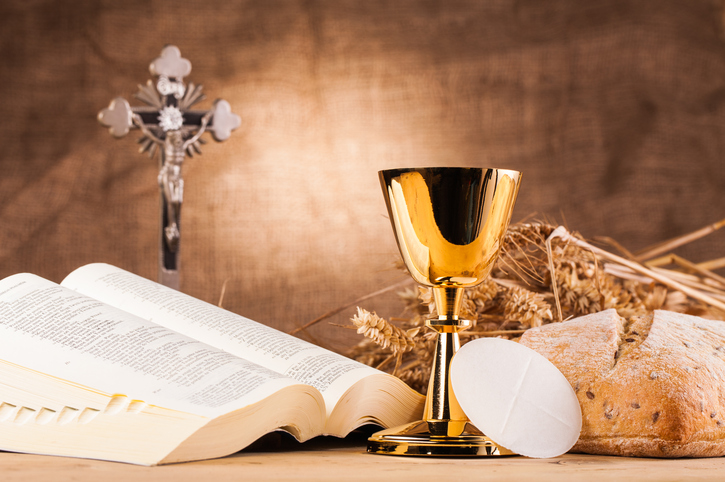John 6 is dense with meaning, and the Church breaks out the reading of it over several Sundays. It begins with Jesus feeding more than 5,000 with a few loaves and fishes and then quietly withdrawing before they can make him king; he wants to illustrate that the Kingdom is not what they think it is, and his Kingship is different than they envision.
Last week, we saw the crowd taking boats to Capernaum in search of Jesus because of this miracle, and he tries to help them see that their true hunger cannot be satisfied by endlessly and miraculously multiplying loaves of bread; that Gospel reading ends with Jesus proclaiming, “I am the bread of life,” come down from Heaven like manna.
Today’s Gospel begins with the Jews protesting against this statement; after all, they know him and his parents, so what is he talking about? Jesus tells them to stop complaining amongst themselves but does not directly answer their objections; he prefers to get right to the heart of the matter. He works to draw them into understanding a big truth, one that he surely realizes they cannot fully grasp: he is sent by the Father, and he will raise up on the last day those whom the Father draws. They must believe in order to access this eternal life from the Father, through Jesus. Then he invites them to this belief by stating again clearly, “I am the bread of life,” the bread of eternal life, “the living bread that came down from heaven.” Whoever eats this bread will live. Will they accept this? Will they believe and live? Almost as if daring them to turn away in horror, he amplifies this boldly: “the bread that I will give for the life of the world is my flesh.”
We cannot blame the Jews for their disbelief and rejection (which we will hear about next weekend!) of these graphic words; they interpret this as a kind of cannibalism, which is forbidden and repugnant. Even his close friends did not really understand what he could mean by these words at this point in their journey with him.
Only over time (and the light of the Holy Spirit) did they understand what Jesus meant by giving his flesh for the life of the world, as they witnessed his passion and crucifixion. Only over time did they understand what it meant to be “raised up,” as Jesus rose from the dead. Only over time did they understand that we are given, not a corpse as “bread,” but the glorified Body, Blood, Soul, and Divinity of the Risen One in the sacrament of the Eucharist. Only over time did they understand that this Bread that is Jesus is the only way to fill the deepest hunger of the human person, the Source and Summit of the Christian life.
Where are we in our journey to understanding and accepting this fundamental Truth of our faith?

Kathryn is married to Robert, mother of seven, grandmother to two, and a lay Carmelite. She has worked as a teacher, headmistress, catechist, Pastoral Associate, and DRE, and also as a writer and voice talent for Holy Family Radio. Currently, she serves the Church as a writer and presenter, and by collaborating with the diocesan Office of Faith Formation, individual parishes, and Catholic ministries to lead others to encounter Christ and engage their faith. Learn more at www.kathryntherese.com or on Facebook @summapax.
